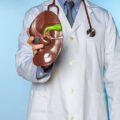COMMENT:
Viral-related HCC cases are decreasing globally due to the development of efficient antiviral therapy & vaccination, yet NAFLD-associated HCC is becoming a global problem. HCC has several risk factors, all commonly found in NAFLD patients: type 2 diabetes, obesity, cardiovascular disease and dyslipidaemia. Currently, alpha-fetoprotein (AFP) is the most commonly used biomarker for the diagnosis of HCC, followed with MRI or CT scans. This paper discusses the benefits of establishing a multidisciplinary team for the treatment strategy of these patients. Treatment methods from this multidisciplinary team can involve options such as hepatic resection, ablation (for those at stage 0), liver transplant, as well as other options. However, current data on treatment for NAFLD-associated HCC is lacking. For example, NAFLD patients have been identified as having several features that could limit the detection of tumours; for example, obesity decreases visualisation, and obesity is a common comorbidity with NAFLD. There are also generally little randomized control trials for this population, so this is an urgent need.
This review by Cadar R et al. aimed to discuss the need for further research in NAFLD-associated HCC, as well as the importance of multidisciplinary treatment.
KEY LEARNINGS:
Overall, there are currently promising results from non-NAFLD-associated HCC research, which can provide a basis of learning for NAFLD patients. However, greater research is urgently needed due to the overlap in risk factors such as type 2 diabetes, obesity, cardiovascular disease and dyslipidaemia.


Hepatic inflammatory responses in liver fibrosis